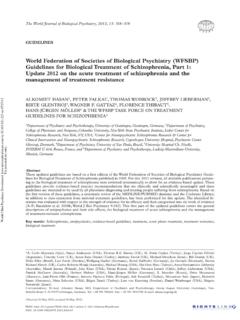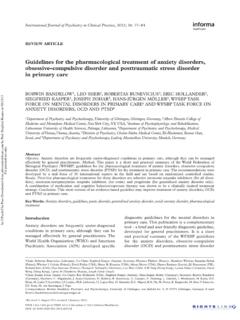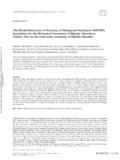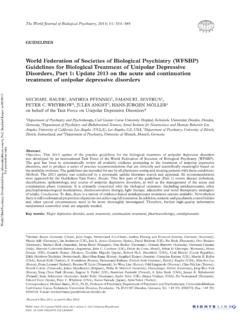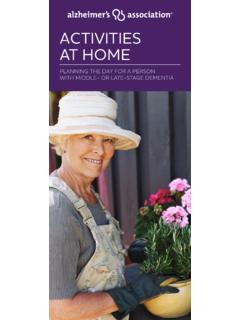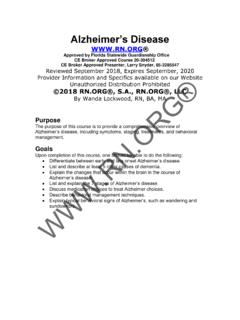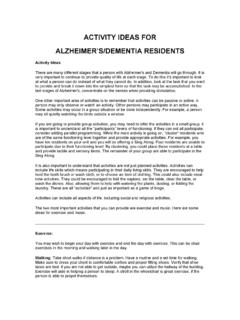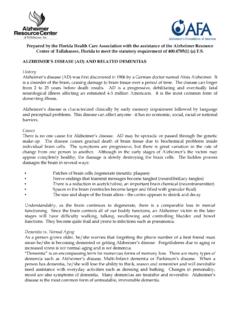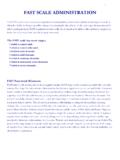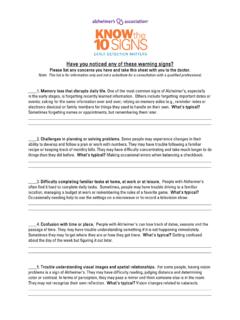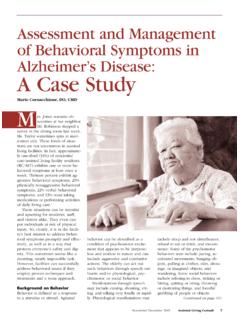Transcription of World Federation of Societies of Biological …
1 GUIDELINES World Federation of Societies of Biological Psychiatry (WFSBP) Guidelines for the Biological Treatment of alzheimer s disease and other dementias RALF IHL 1 , LUTZ FR LICH 2 , BENGT WINBLAD 3 , LON SCHNEIDER 4 , ALISTAIR BURNS 5 , HANS-J RGEN M LLER 6 & WFSBP TASK FORCE ON TREATMENT GUIDELINES FOR alzheimer S disease AND OTHER DEMENTIAS 1 Alexian Hospital Krefeld and Department of Psychiatry, University of Duesseldorf, Germany, 2 Division of Geriatric Psychiatry Central Institute of Mental Health Mannheim University of Heidelberg, Mannheim, Germany.
2 3 Karolinska Institute, Neurotec, Huddinge, Sweden, 4 University of Southern California Keck School of Medicine, Los Angeles, CA, USA, 5 Psychiatry Research Group, University of Manchester, Manchester, UK, and 6 Department of Psychiatry and Psychotherapy, University of Munich, Munich, Germany Abstract Objectives. To defi ne a practice guideline for Biological treatment of dementia and to make transparent the development of the guideline connecting the original data with the resulting recommendations. Methods. This guideline includes pharma-cologic treatment considerations for patients with alzheimer s disease , vascular dementia, DLB, and fronto-temporal dementia.
3 Studies were selected that represent double-blind placebo-controlled trials of at least 3 months duration in patients with a diagnosis of dementia according to accepted international diagnostic criteria (for example the NINCDS/ADRDA or NINDS/AIREN criteria). Moreover, to be included studies had to fulfi ll a restrictive set of methodological criteria. Original studies and not meta-analyses determined the evaluation and the development of recommendations. Results. Antidementia pharmaceuticals neither cure nor arrest the disease . A modest effect of improvement of symptoms compared with placebo can be observed.
4 Antidementia pharmaceuticals show different effi cacy and side effect profi les. The type of dementia, the individual symptom constellation and the tolerability should determine what medication should be used. There are hints that combination therapy of drugs with different therapeutic mechanisms might improve the effi cacy. In treating neuropsychiatric symptoms (NPS), psychosocial intervention should be the treatment of fi rst choice. Pharma-ceuticals can only be recommended when psychosocial interventions is not adequate. However, even then the side effects of pharmaceuticals limit their use. Conclusions.
5 Depending on the diagnostic entity and the pathology treated different anti-dementia drugs can be recommended to improve symptoms. In the management of NPS, side effects limit the use of medications even when psychosocial interventions have failed. Thus, there is an urgent need to develop more effi cacious medications for the treatment of dementia. Key words: Dementia , guidelines , alzheimer , vascular dementia , Lewy body disease , fronto-temporal dementia , anti-dementia pharmaceuticals , neuropsychiatric symptoms , NPS , Biological , treatment Bengt Winblad (Chairman; Sweden), Lon Schneider (Co-Chairman; USA), Alistair Burns (Co-Chairman; UK), Lutz Fr lich (Secretary; Ralf Ihl (Co-secretary), Germany); Hans-J rgen M ller (Chairman of the WFSBP Committee on Scientifi c Publications; Germany); Rafael Blesa (Spain); Henry Brodaty (Australia); Jean-Francois Dartigues (France); Istwan Degrell (Hungary).
6 Steve DeKosky (USA); Hidetoshi Endo (Japan); Timo Erkinjjuntti (Finland); Hans F rstl (Germany); Giovanni Frisoni (Italy); Serge Gauthier (Canada); Ezio Giacobini (Switzerland); Teresa Gomez-Isla (Spain); Carl-Gerhard Gottfries (Sweden); Michael Grundman (USA); Changsu Han (Korea); Christoph Hock (Switzerland); Josef Marksteiner (Austria); Colin Masters (Australia); Ian McKeith (UK); Maria Olofsdottir (Iceland); Jean-Marc Orgogozo (France); Michael Rainer (Austria); Barry Reisberg (USA); Peter Riederer (Germany); Martin Rossor (UK); Bernd Saletu (Austria); Eric Salmon (Belgium); Trey Sunderland (USA); Masatoshi Takeda (Japan); Bruno Vellas (France); Frans Verhey (Netherlands); Gunhild Waldemar (Denmark); Peter Whitehouse (USA).
7 Correspondence: Ralf Ihl, MD, Head of the Clinic of Geriatric Psychiatry and Psychotherapy Alexian Hospital, Oberdiessemer Str. 136, 47504 Krefeld, Germany. Tel: 49 21513 47904. Fax: 49 21513 47901. E-mail: The World Journal of Biological Psychiatry, 2011; 12: 2 32 ISSN 1562-2975 print/ISSN 1814-1412 online 2011 Informa HealthcareDOI: WFSBP Guidelines for alzheimer s disease and other dementias 3 Federation of Societies of Biological Psychiatry (WFSBP, Bandelow et al. 2008a, Table I). Whenever a level of evidence is referred to herein it will be consistent with Table I.
8 Grade of recommendation In the current literature, several different scales to grade recommendations are used. None of the scales offers any validation data. The grading scale used here was developed and used by the WFSBP (Ban-delow et al. 2008b, Table II). To develop recommen-dations, scientifi c evidence was taken into account as well as side effects and the highest possible out-come of therapy. For the following recommenda-tions, it is important to remember that available anti-dementia medications neither cure nor arrest the disease . Even the effect on symptoms is modest.
9 For NPS accompanying the disease , treatments fol-lowing these recommendations might mitigate or even eliminate a particular NPS without infl uencing the underlying disease . Introduction Dementia is a syndrome of acquired cognitive defi cits suffi cient to interfere with social or occu-pational functioning, which results from various central brain pathological processes. It is defi ned by the existence of defi cits in episodic memory and in other cognitive domains. The syndrome is diag-nosed in association with behavioural assessment, neuroimaging and laboratory investigations.
10 Defi -cits in cognitive domains include global cognitive Preface and disclosure statement Like with the preceding guidelines of this series (Bauer et al. 2002, Bandelow et al. 2008b), these practice guidelines for the pharmacological treat-ment of alzheimer s disease and other dementias(AD) were developed by an international Task force of the World Federation of Societies of Biological Psychiatry (WFSBP). Their purpose is to provide expert guidance on the pharmacological treatment of dementia based on a systematic overview of all available scientifi c evidence pertaining to the phar-macologic treatment of AD and other disorders associated with dementia.

